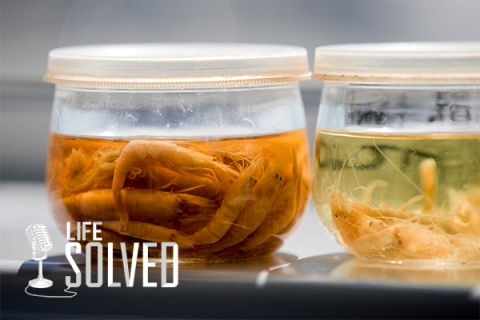

A University of Portsmouth Professor tells us about his discovery of ‘zombie’ parasites in UK waters in our podcast, Life Solved.
Professor Alex Ford was studying the behaviour of animals in polluted waters when he noticed some strange behaviour and even unexpected changes in their sex.
A mystery to solve
Professor Ford noticed that some shrimp in polluted areas had taken on the characteristics of male and female, whereas other crustaceans were found swimming into the light… and the jaws of waiting seabirds. But why had these organisms developed such life-threatening characteristics?
The team’s studies allowed them to identify organisms that were able to change aspects of their host’s behaviour and reproduction: a zombie-like parasite! Further research showed that these organisms worked via the host’s endocrine system. Professor Ford then looked at the impact of chemicals that follow the same mechanisms, such as some antidepressants, and realised that their presence in a controlled environment had the same impact on the animals.
Chemicals in the water, chemicals in our bodies
This raised an important question: if such powerful chemicals can make their way into our coastal waters, then what impact are they having in the water we drink, and along the food chain?
A key turning point in the study was the realisation that crustaceans share some of the same neurotransmitters as humans. If the shrimp were impacted by the presence of active chemicals in the water supply, then it was possible that other creatures were too.
The team developed a ‘toolkit’ for examining the processes that were affected in shrimp, from the nervous system to the reproductive and immune systems. With that methodology, they now hope to explore the impacts of certain chemicals on other animals, including humans.
Starting with the most common drugs taken by humans, and those which do not break down easily in sewage treatment plants, Professor Ford’s team are prioritising research into substances that could have the biggest impact on wildlife health.
Raising Awareness
Another vital aspect of this work is the raised awareness in the wider community about the presence and journey of chemicals into the water supply. Professor Ford also hopes that by educating the wider public on the harmful effects of flushing unwanted drugs and substances away, we can begin to reduce the volume of pharmaceuticals circulating in our waters.
Listen to the Life Solved podcast
The Life Solved podcast explores the world-changing ideas and research coming out of the University of Portsmouth.
You can listen to Professor Ford’s episode, "Parasites and Pollutants", on all podcast apps from Tuesday 17th of November. Search for 'Life Solved' on any app or online to listen.
